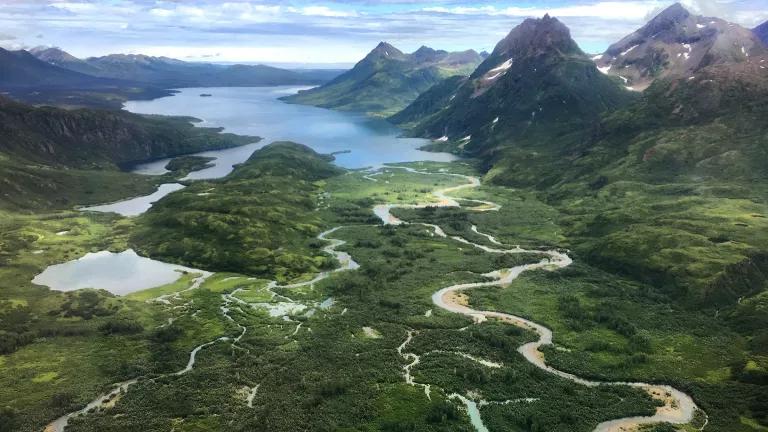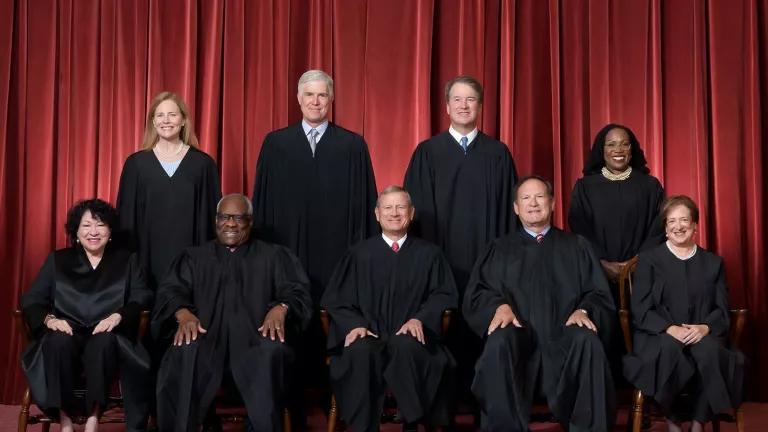EPA Issues Proposal to Protect Bristol Bay, Stop Pebble Mine
This is a watershed moment and a monumental milestone in the decades-long fight to protect Bristol Bay.
EPA’s Proposed Determination, if finalized, would prohibit development of the Pebble Mine and provide lasting protections for parts of Bristol Bay
The Environmental Protection Agency (EPA) issued a notice today that it will publish tomorrow a Proposed Determination pursuant to Section 404(c) of the Clean Water Act that, once final, would provide durable lasting protections against the Pebble Mine and for the world’s most valuable sockeye salmon fishery. EPA’s notice and press release appeared on its website today, and the Proposed Determination is scheduled to be published in full tomorrow.
This is a watershed moment and a monumental milestone in the decades-long fight to protect Bristol Bay. It demonstrates EPA’s clear commitment to protecting the national treasure that is Bristol Bay and brings the agency one step closer in the 404(c) regulatory process towards permanent protection.
If finalized, it would be a death blow to the Pebble Mine—a proposal to gouge one of the world’s largest open-pit mines at the headwaters of the world’s greatest wild salmon fishery in Bristol Bay.
Although exact details won’t be known until full publication tomorrow, at first glance EPA’s 404(c) Proposed Determination would apply to certain waters in the South Fork Koktuli River, North Fork Koktuli River, and Upper Talarik Creek watersheds in Bristol Bay and would:
- Prohibit discharges of dredged or fill material associated with mining the Pebble deposit, as defined by the mine plan submitted by the Pebble Limited Partnership in 2020.
- Restrict discharges of dredged or fill material associated with any future plans to mine the Pebble deposit.
It would not apply to other resource development projects in Alaska.
EPA will accept public comments on the Proposed Determination through July 5. The agency will also hold public hearings in Bristol Bay on June 16 and 17, as well as a virtual hearing on June 16.
This Proposed Determination comes more than a decade after Bristol Bay Tribes formally requested Section 404(c) Clean Water Act protections for Bristol Bay, and it picks up where the Obama-Biden administration left off in 2014.
Section 404(c) of the Clean Water Act authorizes EPA to prohibit, restrict, deny, or withdraw the use of any defined area as a disposal site for dredged or fill material whenever the agency determines it would have an unacceptable adverse effect on fishery areas and other important resources in the region.
EPA rarely uses this authority, issuing only 13 determinations under Section 404(c) since 1972.
Final 404(c) action is urgently needed here to protect the world’s largest wild salmon fishery from what would be one of the world’s largest open pit mining developments ever conceived. The Pebble Mine would produce billions of tons of toxic mining waste, posing unacceptable and significant risks to the waters of Bristol Bay.
The Bristol Bay Watershed is one of the last pristine environments remaining in the world, and its wild salmon is critical to the lives and livelihoods of Alaska Native villages that have thrived for millennia, fishermen and businesses, and future generations of Alaskans and Americans. Salmon is the lifeblood of the region, supporting a $2.2 billion annual commercial fishery, generating 15,000 jobs, supplying 57 percent of the world’s sockeye salmon, and sustaining Indigenous communities since time immemorial.
Bristol Bay Tribes first petitioned EPA for 404(c) action in 2010—which led to a three-year, twice peer reviewed scientific assessment of the risk of large-scale mining in Bristol Bay. In 2014, EPA issued a Proposed Determination under Section 404(c) to restrict mining at the Pebble deposit in Bristol Bay. The 2014 Proposed Determination was never finalized; the Pebble Limited Partnership challenged it in court and tied EPA’s hands for years. Enter the Trump administration, which then settled the litigation favorably to Pebble and ultimately withdrew the Proposed Determination in 2019.
Bristol Bay Tribes, commercial fishermen, Trout Unlimited, NRDC and others challenged that 2019 unlawful withdrawal. Last November, the U.S. District Court of the District of Alaska remanded and vacated the 2019 withdrawal—reinstating as a matter of law EPA’s 2014 Proposed Determination illegally withdrawn by the Trump administration.
Leading us to this moment.
Instead of merely readopting the 2014 Proposed Determination, EPA updated and revised its Proposed Determination to reflect new developments since 2014, including new science and the Clean Water Act permitting process undertaken by the U.S. Army Corps of Engineers from 2017 to 2020. The Army Corps ultimately denied Pebble Mine its Clean Water Act permit, issuing a Record of Decision that concluded the project would cause significant degradation to the Bristol Bay watershed and is contrary to the public interest.
After publishing its Proposed Determination in full tomorrow, EPA’s next step in the regulatory process is the public comment period running through July 5. It will then decide whether to prepare a Recommended Determination—followed by a Final Determination—that would prohibit and restrict large-scale mining in the Bristol Bay watershed.
If finalized by EPA, a 404(c) determination could provide durable protections for Bristol Bay headwaters—and stop the Pebble Mine from being developed.
The Tribes, commercial fishermen, and people of Bristol Bay have called on EPA to provide full and lasting protections for Bristol Bay.

NRDC stands committed to achieving the region’s vision and urges EPA to finalize a 404(c) determination that prohibits the Pebble Mine and offers strong and durable protections for Bristol Bay.
The time is NOW to stand with and for Bristol Bay.




